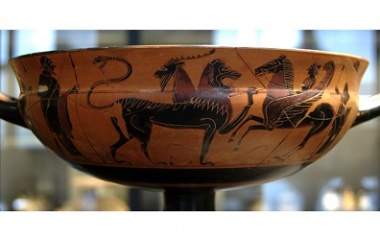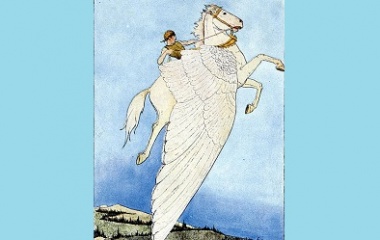- Pronunciation: buh-LAIR-uh-fon
- Origin: Greek
- Role: Hero
- Symbols: Pegasus, Chimaera
- Wife: Philonoe
- Children: Isandros, Hippolokhos, Laodameia, Deidameia
Who Is Bellerophon?
Bellerophon was a hero in Greek mythology. He was the son of Glaucus, King of Corinth, and Eurynome. He was the grandson of Sisyphus. He was known for taming and riding Pegasus, conquering the terrifying monster, Chimaera, and defeating the Amazons in battle.
His story serves as a lesson for humankind as it tells how pride can erase one’s success and instead serve as one’s legacy. While Bellerophon was once honored by the gods and was able to conquer the world with their help, he grew selfish and conceited, which eventually led to his downfall.
Origins
Bellerophon’s grandson, Glaucus (named after his great-grandfather) tells the tale of his grandfather in the Iliad. Both his family line and quests are well documented by Glaucus.
Legends and Stories
The myths surrounding Bellerophon contain quests that are worthy of a hero. With the gods on his side, it seemed that there was nothing he couldn’t conquer.
Pegasus
Bellerophon’s father instilled an interest in horses in him early on, so it is not surprising that Bellerophon’s myth would start with his quest for Pegasus, the well-known winged horse in Greek mythology. After several attempts to tame the horse, Bellerophon turned to Polyeidus, a famous seer from Corinth, for advice.
He instructed the hero to spend the night in the temple of Athena. While there, Bellerophon dreamt of a goddess that gave him a magical, golden horse bridle. He woke up and found himself holding the exact bridle from his dreams. He wisely offered a sacrifice to both Poseidon and Athena and immediately went to the meadow where Pegasus was grazing. However, he was unable to tame the horse.
He was persistent though, and with the magical bridle in hand, he was eventually triumphant. He rode Pegasus to King Pittheaus to show him that he had achieved the impossible. As a reward, he was offered the hand of King Pittheaus’ daughter, Aethra, in marriage. However, tragedy struck before the wedding. The details vary depending on the source, but Bellerophon accidently killed a man, possibly a brother or a tyrant, and was punished by being banished from his home.
Chimaera
After being banished from his homeland, Bellerophon rode Pegasus to King Proetus. He asked to be pardoned from his crime. The king agreed, and allowed him to stay with him. King Proetus’ wife, Stheneboea, was attracted to the young hero and attempted to seduce him. But Bellerophon was an honorable man and refused her advances. This did not sit well with Stheneboea, so she decided to seek revenge by accusing him of attempting to seduce her, which infuriated her husband.
King Proetus wanted to get rid of Bellerophon, but because he was so loved by the public, accusing him of anything negative would most likely backlash. It was an offense to the gods to do any harm to a house guest, so his options were limited. He came up with a plan to send Bellerophon to his wife’s father, King Iobates. To get Bellerophon to go, King Proetus gave him a letter that he said needed to be delivered urgently.
Bellerophon took Pegasus to Iobates’ home. He was warmly received, and quickly made himself at home. He delivered the letter, which told King Iobates of the man’s unwanted advances on his daughter. King Iobates now found himself just as upset as King Proetus, and facing the exact same problem. He could do Bellerophon no harm, because he would be punished by the gods. But King Iobates came up with a plan of his own.
He decided to ask Bellerophon to take on a series of quests. King Iobates believed these quests to be so dangerous that he would soon find himself without a house guest, and still be worthy of the gods. But he was taken back by the ease with which Bellerophon seemed to conquer the impossible. He was a skilled archer, and with Pegasus’ help, he was able to win every battle he entered. He had the support of the gods on his side as well.
His first quest was to kill a monster known as Chimera, a fire-breathing hybrid creature. Most artistic representations of the Chimera show an animal that resembles a lion, with the head of a goat protruding from its back and a tail that ends with a snake’s head. Bellerophon was able to defeat the monster by shooting her from a safe distance as he rode on Pegasus.
After defeating the monster, he was sent to take on a nearby tribe, who just so happened to be the enemies of King Iobates. The hero easily defeated the tribe and was then sent to take on the Amazons. Again, he was victorious. King Iobates was growing restless and turned his own army against Bellerophon, who killed all but one soldier.
This finally showed King Iobates the truth: with the gods on his side, Bellerophon could conquer anything. The king apologized to the hero and gave him half of his kingdom. He also gave his daughter, Philonoe, in marriage.
The fate of Stheneboea is unclear. In some versions, Bellerophon seeks revenge and offers to take her for a ride on Pegasus. Once in the air, he pushes her off and she falls to her death. In other versions, words reaches Stheneboea that Bellerophon has married her sister. She fears that she will be caught in her lie and takes her own life.
Family
Poseidon and Eurynome were the parents of Bellerophon. However, Eurynome’s husband, Glaucus, raised him as he believed him to be his own son by blood. After taming Pegasus and conquering his enemies, Bellerophon eventually settled down and married Philonoe. He was happy with her and was pleased with the birth of his children. He had two sons, Hippolokhos and Isandros, and two daughters, Deidameia and Laodameia. During his reign as king, he was loved and honored by his people.
Unfortunately, however, Bellerophon’s new life wasn’t as satisfying as his past experiences. He decided that he would visit the gods to ask for a new quest and rode Pegasus to Mount Olympus. Zeus was unhappy about this and sent a gadfly to sting Pegasus, throwing Bellerophon off his back. He survived the fall, but was permanently crippled. As punishment, he spent the rest of his life wandering and seeking help but no one would help because he had offended the gods. He died alone, but the exact cause is unknown as no one was present to record it.
Appearance
Bellerophon is depicted as a young and strong man. He is usually pictured with Pegasus, either feeding the horse or riding it. In every image of him, he appears to be fit and attractive. His appearance gives off a feeling of power and control. He looks just as a hero should, especially in pictures of him conquering his enemies.
Symbology
Bellerophon has two symbols associated with him and his quests. The first, and most common, is a picture of him on the back of Pegasus. The second is a picture of him defeating the monster Chimera. He used a spear to conquer the monster, and this is always depicted in the image. According to Greek mythology, the spear held magic powers, which certainly aided in his quest along with his support from the gods. Because he was the son of Poseidon, he is sometimes associated with water as well.










